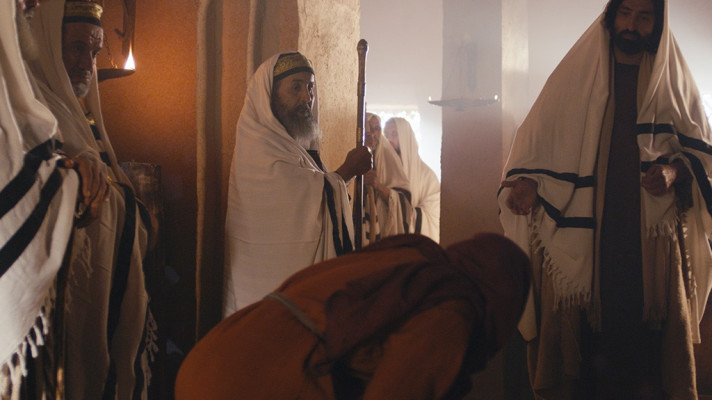Made Straight
Pastor Michael Blog 11 Aug 2017 Michael Falzarano

And there was a woman who for eighteen years had had a sickness caused by a spirit; and she was bent double, and could not straighten up at all. (Luke 13:11)
This woman’s life was in ruins. She had a physical condition that caused her to be bent over for 18 long years. This means her view was downwards, away from the Sun’s rays and towards the dinge of the streets. She had no power or means to become straight, or to dispel the darkness of her situation. The same is true spiritually, as it is for all, for all “have sinned” (Romans 3:23). Due to our iniquity we are bent. We were created to be vertical to God and horizontal to others in selfless love and service. But due to sin mankind became bent towards selfishness. We have no power to straighten ourselves, as we are all “dead in… trespasses and sins” (Ephesians 2:1).
This infirmed woman had a low profile in society, an outcast to many. In particular the religious leaders would have been prone to shun her. But the passage poignantly states that Jesus “saw her.” Jesus takes notice of every afflicted soul. He not only sees but he feels and sympathises with us, as he himself bore our “griefs and carried our sorrows” (Isaiah 53:3). His eyes and heart misses none.
Jesus calls this enfeebled woman to himself. This invitation extends to all. And he speaks with heaven’s love and power, “You are freed from your sickness.” This would have been enough, as his word heals and sets right. But Jesus proceeds by touching (laying hands upon) this “unclean” soul. We have a saviour that not only invites us to come to him for healing, but one who made physical contact with us. He took humanity and was tempted as we are. Jesus took the pain and the blight of our disease upon himself. He therefore not only sees our struggles but also has experienced them firsthand.
This woman was now marvellously straight, pointing like a sunflower towards the Sun of righteousness (Malachi 4:2). In so doing she became a torch of God’s power and mercy. She freely glorifies Him. So will you, if you allow him to straighten you through his word and connective touch. You can know your sins are forgiven and be freed of any guilt or bondage that you bear.
Accept his invitation! Make hast and receive His deliverance!
Image used by permission of LumoProject
The Least Of These My Brethren
Pastor Michael Blog 28 Jun 2017 Michael Falzarano

“And the King will answer and say to them, 'Assuredly, I say to you, inasmuch as you did it to one of the least of these My brethren, you did it to Me.'“ (Matthew 25:40, NKJV)
Love for God is best expressed by loving others. The Bible is clear that Christians are to have compassion on those in need. Compassion involves sympathy, but words are often expressed best through practical doings. We are not to aid others in order to make Christians, but by aiding others we are able to express true Christianity, thereby leading them to Christ.
The practical doings mentioned in this parable are visiting the imprisoned, clothing the poor and feeding the hungry. But who are the “least of these My Brethren”? The Bible elsewhere encourages us to reach out and help the improvised, destitute and abandoned. But in the book of Matthew, Jesus’ brethren appear to apply more to his people. The early church suffered as it took the gospel to the world. Jesus suffered with them, as they suffered because of Him. When we express compassion and meet fellow believers' true needs, we have done it unto Jesus. But if we reject the gospel of Christ we reject Christ, if we reject Christ’s brethren we also reject Him.
In the parable of the Sheep of the Goats, Jesus targets a particular people to lavish compassion upon. Matthew associates these brethren with fellow Christians, not only those needy outside her walls. Therefore, judgment concerns not only our response to Christ and His gospel, but also our response to those who preach it and live by it. Many gospel workers continue to be imprisoned, beaten and impoverished for the simple fact they love and follow Jesus. Jesus identifies with them and with their sufferings. He feels their pain, heartache and sorrow. In a more narrow reading than, as Christians we are to love and support our fellow brothers and sisters in their sufferings and need, and in so doing show our love for Christ.
The amazing thing is that these servants of Jesus fail to realise they are indeed responding to Him when they are responding to the needs of their brethren. This is because their works of compassion flow from God. They do, because they are, not so they can get. They have connection with the God of compassion; therefore they are merely active extensions of it. When we respond to the needs of our brothers and sisters in Christ, we are actually responding to Jesus. Therefore, let us ease His tears by easing their tears.
Image by Treehugger / Allison McAdams
He Himself Is Our Peace
Pastor Michael Blog 02 Jun 2017 Michael Falzarano

These things I have spoken to you, that in Me you may have peace. In the world you will have tribulation; but be of good cheer, I have overcome the world. (John 16:33)
An Anzac memorial service that I attended a number of years ago, in New Zealand, really stood out. There was a well ordered parade, which was followed by a service at a park. All of which commenced prior to the morning’s light erasing the night’s dimness. The ceremony was captivating. The darkness being broken by the glow of red lights shinning upon a multitude of poppies and a cross. Soldiers stood in statuesque form, as a choir’s voice permeated the still air with songs of hope.
A message of remembrance also pierced through the sombreness, a tribute by a military chaplain for those fallen in Gallipoli and in other battles. The chaplain’s address was well suited for the occasion. And best of all was his prayer, in particular when he prayed for peace, in spite of the remembrance of awful conflicts and wars. He prayed nobly for world peace, for the peace of the country, and for the peace we should have with one another. But the salient punctuation of his prayer was for God’s peace!
How true this is. Without God’s peace abiding in our hearts, there can be no true or lasting peace. We can try to run, hide and evade conflict, but it will not result in inner peace. This is due to the conflict rising from within the human heart, due to our sinful nature. Such is the core to all other conflicts (James 4:1). However, the good news is that there is remedy. For, “Having made peace through the blood of His cross… we have peace with God through our Lord Jesus Christ” (Col. 1:20; Rom. 5:1).
God promises us that there will be a time in the future when there will be no conflicts or wars. Peace will pervade this Earth when made new and never again shall the lack of peace disturb it. This will happen after Jesus’ return and when his kingdom is forever established. But we need not wait for that. We can experience lasting peace right now. The peace the world offers is at best superficial and temporal. But God’s peace is deep, satisfying and eternal.
This is because it comes from above and is anchored firmly within the soul. It goes so deep that no agitation or disturbance can penetrate it’s boundaries. God’s peace stills the nerves, even if we should be buffeted by the winds of strife and turmoil.
How do we obtain it? There is only one way! We must put our faith in Christ and His redemptive ministry for us. We must lay down our weapons and let Him be the victor of our soul. We must give Him our troubled hearts and in turn receive His abiding rest. Receive it! Embrace it! How? By receiving and embracing Jesus daily. “For He Himself is our peace” (Eph. 2:14).
Image used by permission of SermonView